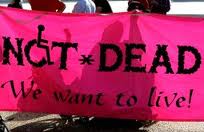This Press Release was published on the Not Dead Yet website.
Princeton, NJ (PRWEB) June 09, 2015
Disability rights activists from Pennsylvania Not Dead Yet and New Jersey centers for independent living, as well as groups representing parents of people with disabilities, will be marching to Princeton University and holding a protest on June 10, 2015. Activists want Princeton to publicly denounce recent statements by Professor Peter Singer, promoting ending the lives of disabled infants through denial of health care, and for Princeton to take other steps to address what the activists describe as Singer’s “hate speech” toward disabled people.
“Since about 1980, Singer has promoted public policy that would legalize the killing of disabled infants in the first month of life,” said Stephen Drake, Not Dead Yet’s research analyst and expert on Singer. “More recently, he has expanded his position in the context of health care rationing.”In 2009, the New York Times Magazine published an article by Singer titled ‘Why We Must Ration Health Care.’ In the article Singer spoke hypothetically of assigning a life with quadriplegia as roughly half that of a life without any disability at all. On this basis, Singer laid out a case for denying health care to people with significant disabilities on the basis that these lives have less value than the lives of nondisabled people. A response signed by 20 disability rights organizations was submitted to the magazine, criticizing the decision to seek out Singer as an analyst of healthcare and for the specific content of the article.
“This was probably Peter Singer’s most direct assault on the value of the lives of people with physical disabilities past the age of infancy,” said Drake.On April 26, 2015 on “Aaron Klein Investigative Radio,” Singer again rationalized the killing of disabled infants. Three days later, the National Council on Disability, a council appointed by the U.S. President to provide advice on disability policy, issued a press statement on Singer’s comments during the show. According to the NCD release:
Singer told Klein that health care rationing is already happening, and surmised that hospitals routinely make decisions not based on need, but rather on cost. He then used the presumed practice to rationalize the killing of disabled infants by arguing in support of “non-voluntary euthanasia” for human beings who Singer contends are not capable of understanding the choice between life and death, including “severely disabled infants, and people who through accident, illness, or old age have permanently lost the capacity to understand the issue involved.”In addition, Not Dead Yet issued a petition to Princeton through change.org.
“We understand the importance of academic freedom,” said Alan Holdsworth of Not Dead Yet Pennsylvania. “But Princeton has a policy on ‘Respect for Others’ which ‘deplores expressions of hatred directed against any individual or group.’ If Singer’s comments about killing disabled babies don’t qualify as hatred toward a group, then I don’t know what does.”Protesters are demanding that Princeton take four actions to address Singer’s comments:
- Call for Singer’s resignation.
- Publicly denounce Singer’s comments.
- Hire a bioethicist from the disability community in a comparable position to provide a platform for views that contrast with his.
- Create a disability policy program at Princeton to educate future leaders on an inclusive community.


2 comments:
I cannot believe the contrary standards being proposed. Previously parents have had children made wards of the state if they felt their offspring were too damaged or frail to undergo certain surgeries and treatments, and now people are suggesting we euthanize them.
What do you think the state did with the children who were made wards of the court.
Post a Comment